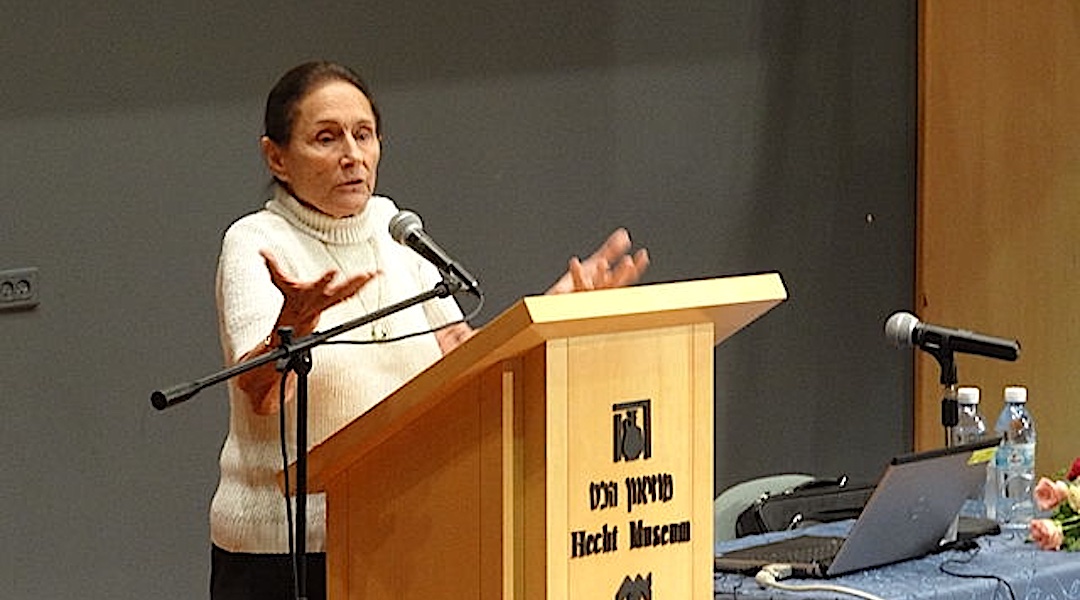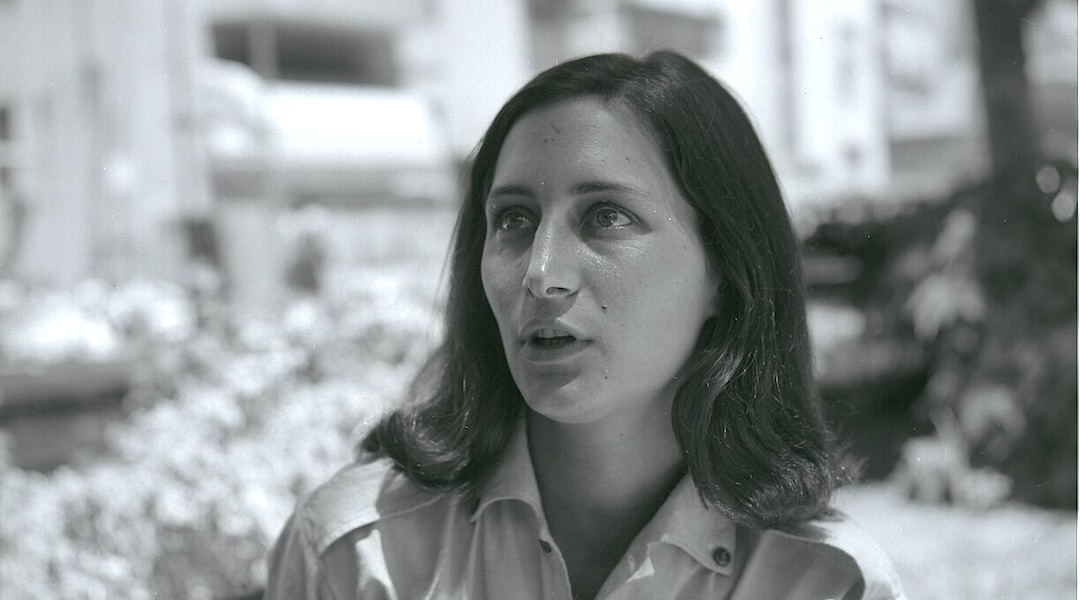Yael Dayan, Israeli writer, politician, peace activist and general’s daughter, dies at 85
The daughter of Israeli General Moshe Dayan served three terms in the Knesset and was one of the leaders of Peace Now

Yael Dayan gives a lecture at Haifa University to the Women’s Studies and Gender program, Nov. 12, 2014. (Hanay/Wikimedia Commons)
(JTA) — Yael Dayan, the daughter of a famed Israeli military and political leader who charted her own course as a champion of peace, gay rights and women’s rights in Israel, died Saturday. She was 85.
A journalist who wrote novels and memoirs, Dayan also served in the Israeli Knesset for three terms between 1993 and 2002 representing the Labor Party and a centrist coalition, the One Israel Party. She later served as chair of the Tel Aviv City Council, representing the dovish Meretz party
She was a daughter of Israel’s founding Ashkenazi royalty: Her father was Moshe Dayan, an architect of Israel’s victories in the 1967 and 1973 wars, and her grandfather, Shmuel Dayan, served in Israel’s first government.
In her 1986 memoir, “My Father, His Daughter,” written and published approximately 30 years after the events it describes, she remembered the lessons she learned from her soldier father as she herself joined joined the battle in the Six-Day War. “All the years with my father must have contributed to this lack of fear, and I could not think of anything more natural or obvious than being in the place where I was — on the dirt road in Sinai facing a hardening mask of dust, surrounded by combat fighters, making my way towards the Suez Canal,” she wrote.
She also wrote candidly about his extramarital affairs and his shortcomings as a father. Her mother, Ruth Dayan, died in 2021 at age 103.
When pressure built on Moshe Dayan to resign as defense minister in the wake of the 1973 Yom Kippur War, his daughter told the Jewish Telegraphic Agency: “I don’t think he should resign. I believe in him. I accept his political and personal decision because I know his integrity and honesty.”
And yet in the same interview she called for a new generation of Israeli politicians, which she herself would represent. In a tweet on news of her death, former Meretz MK Mossi Raz praised Dayan as a pioneer in the fight for LGBTQ rights and feminism in Israel. He noted her 1990s legislation outlawing sexual harassment, and her work as a peace activist.
Dayan was born at the Nahalal moshav, a cooperative farming community, under the British Mandate. Her late brother Assi was a noted film director, actor and screenwriter; her brother Udi is a sculptor.

Yael Dayan in 1962. (Boris Carmi/Wikimedia Commons)
After serving in the IDF as a captain in the Spokesperson’s Unit, Dayan studied international relations at Hebrew University and biology at the Open University of Israel.
She was a reporter and columnist for a number of Israeli dailies, and joined the leadership of Peace Now, an organization formed in the 1980s advocating for talks with the Palestinians and a two-state solution to the conflict. She twice served as chair of the Knesset’s Committee on the Status of Women.
In a 2020 interview she lamented the demise of the Labor Party and the dominance of the right-wing leadership that succeeded her father’s generation — one that increasingly has few women participating in prominent positions.
“The right’s policies have caused very serious social fault lines, impoverishing a significant part of the country while simultaneously not investing in Israeli start-ups, research and innovation,” she said. “The problem is a lack of strong roots but above all I believe a lack of vision, the ability to imagine an Israel other than the one created by the right. This was the vision that inspired Israel’s founding fathers, which fueled Zionist pioneers. It is not nostalgia for the past, although at my age I could indulge in such feelings.”
Her survivors include a daughter, Rachel Sion Sarid, and a son, Dan Sion, from her marriage to Don Sion, who died in 2003.
This article originally appeared on JTA.org.














